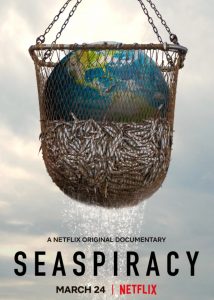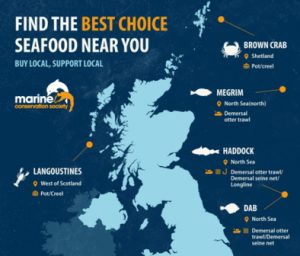This story contains a call to action and a defamation, ignore it at your peril.
If you apply the same actions in your destination we would love to hear from you at: admin@sea-agency.uk
Let Earth-day 2021 become our Inter-dependence day.
2020 may have been a watershed but 2021 has been the recognition of the nightmare we face. Recently I have learned of plastic rain, witnessed major local pollution issues whilst the regulators (SEPA) lose all their records to a cyber attack, we are seeing major biodiversity losses and the loss of many productive and creative industries we rely on for our wellbeing. Digital slavery is becoming common-place and we face chaotic climate change based on even more excessive consumption. Into this arena steps the Sea-spiracy documentary on Netflix.

It’s worth a watch and I recommend it to any enquiring mind however I also recommend a tempered approach. First as with any documentary you should recognise that it’s not going to be able to cover everything. Also you need to compare the details from the programme with your own research and information if you have any and thirdly its worth thinking of any global report in the context of what you can do locally to make a difference.
So First and because it’s such an important issue lets agree on the main conclusions:
- Fisheries have been badly managed and in many areas this continues
- Plastic serves as a major threat to our oceans and all life in it
- Fish are a valuable source of healthy proteins for our wellbeing
As a result and given the gravity of the situation I am suggesting a 2 prong approach
- A Boycott of Coca Cola
- Support UK sustainable fish sources
 Yes I even admit I have enjoyed the taste and even liked the song “I’d like to teach the word to sing.” However it was corrupted to “Id like to buy the world a coke” during my childhood. So we see how Coca Cola represents one of the most “notorious” organisations on earth. Originally Coca cola was made of cocaine. Why no one was ever prosecuted for selling such a drug is a surprising but it was the early days and maybe the US regulatory system cannot tackle that issue. Possibly its because Coca Cola effectively invented Father Christmas – that wonderful father figure who gives kids something for nothing every year and lives in a magical realm in the far north.
Yes I even admit I have enjoyed the taste and even liked the song “I’d like to teach the word to sing.” However it was corrupted to “Id like to buy the world a coke” during my childhood. So we see how Coca Cola represents one of the most “notorious” organisations on earth. Originally Coca cola was made of cocaine. Why no one was ever prosecuted for selling such a drug is a surprising but it was the early days and maybe the US regulatory system cannot tackle that issue. Possibly its because Coca Cola effectively invented Father Christmas – that wonderful father figure who gives kids something for nothing every year and lives in a magical realm in the far north.
Now I cannot go on further about that figure as some of you may still believe and belief is a powerful force in the right hands. Unfortunately Coca Cola are not the right hands.
Reasons why Coca Cola are top of my plastic boycott list.
- They are the worlds largest producer of plastic rubbish totalling over 3 million tonnes per annum.
- The made a commitment to change the packaging in their mulitpacks of coca cola which although marketed heavily results in a 0.006 % reduction in their plastic waste.
- When Coca Cola investigated the potential to switch to bioplastics or avoid plastic products all together (there are alternatives, even completely changing the business model) they refused on the basis of existing consumer demand. (I believe they create that – its called their marketing budget!)
- Coca Cola is unhealthy – its full of sugar or artificial sweetners neither of which are considered healthy.
- It is addictive and can cause mental unrest either through hyper activity or attention issues.
- They are considered to be top 5 in the Global ESG ratings system. This is environmental social governance ratings and they join the likes of leading pharmaceuticals and other global empires. This demonstrates a complete systems failure in the regulation and with the consultants and organisations that uphold the standards. Sadly such systems operate as tick box processes and the implementation of third party processes only allows consultants to exploit standards and the businesses wishing to meet them. I have seen this through my own work and the way some organisations propose standards, operate cartels and do not regulate them effectively to raise them as they should. (see the documentaries investigation into Dolphin friendly, marine stewardship council etc.)
How to Boycott Coca Cola
- Simply stop choosing to buy the product personally and for your business.
- Stop stocking the product in your shop or business.
- If you are stuck in a contract choose to provide a note that you would like to avoid selling this and feel compelled to provide consumers with a health warning and possibly this information.
- Share this post. Obviously it would be nice to get some feedback and/or connection but the issue is far more important than my work or role so feel free to use this as you wish.
- Don’t give up. This is a vital issue and if we don’t stop Coca Cola we might as well not do anything. Its obvious they have been disingenuous throughout their history and that should not go unpunished or un-acknowledged. This will be the first of our boycotts and if we work well as a concerted set of consumers, environmentalists and business people we might just begin to tackle the global issues Sea-spiracy is attempting to uncover.
Now you can’t do a negative action without supporting an affirmative action. As we are definitely at the end of an era then I suggest its best first to surrender a favourite and as a reward then celebrate or treat yourself to one. I am sure father Christmas would agree that giving is better than receiving.
- Support of UK sustainable fish sources
Now the second item is to support something positive. The UK has been trying to operate sustainable fishing systems for some years leading on the issue of bi-catch. Unfortunately the EU system allowed bi catch and this was not and is still not being addressed and this was a key part of concerns about stocks. The EU system achieved a take of fish species at or below sustainable yields with 1/3rd being overharvested. Brexit did not address the fishing industry issues effectively and so it remains a troublesome issue. With a new fisheries policy there needs to be an effective process to maintain the health of the UK fishery ecosystem and the quota system needs to be maintained or improved. As a position paper we will produce a basic outline of our thoughts for a sustainable fishery system. Irrespective of the issue of Brexit and its affects on the fishing industry we are encouraging the following:
- Marine Conservation Society – Support the good fish guide or Ocean Wise
 “If you eat seafood, use our Good Fish Guide to find the most sustainable options by looking at what species it is, where it was caught or farmed, and how.”
“If you eat seafood, use our Good Fish Guide to find the most sustainable options by looking at what species it is, where it was caught or farmed, and how.”
I am a supporter of the Marine Conservation Society and have been for a long time. It was established by divers concerned about UK waters and has maintained its integrity throughout. The good fish guide is well researched and simple to understand and the awarding of the label is not related to sales or percentages or margins or any other financial instrument linking marketing to the grading. This is complimentary to our approach creating and developing sustainability standards with partners, training assessors, maintaining them and having effective quality control procedures to maintain consistency. Although the Good Fish Guide is less about management systems rather more about ecological abundance (well with fishing).
As well as the above there are the following best choice options:
- Mussels – Rope grown
- Queen and King Scallops – Rope grown (hand dived might be available too)
- Langoustines -but only those caught in pots or creels
- UK Mackerel – especially that from Cornwall
- Pole and Line tuna (skipjack, albacore and yellowfin) MCS has more details
Note that I would class rope grown mussels as super sustainable as a key part of their growth is the absorption of CO2 from the ocean to form the animals shell.
As for me I was grown in Manchester where fish and chips was a staple for a Friday night. What’s so good about now living in Scotland is that rather than cod I get haddock and as long as it comes from the North Sea & I can rest assured it supports our economy and is sustainable as well as being delicious and but probably not really that healthy although I have learned of some great lower fat options.
Where Seaspiracy gets it wrong:
- Ocean plastic mainly comes from land sources not from fishing nets its only information on the mid Atlantic gyre that the stats are presented about.
- Not all fish stocks are declining there are many areas where they are doing well
- We could eat fish for good health and if 80% of the planet is off limits for human consumption then we really are doomed. Omega 3 oils are available as a vegan option I have them.
- Tilapia farming and some other fish farming is good as a source of protein and is very important in some destinations like Africa
- Ocean-Wise an ecolabel from Canada was not mentioned but operates a sustainable halibut fishery and accredits wild salmon based upon a sustainable take of returning fish to rivers in British Colombia despite the problems for local fish caused by the aquaculture industry in the area.
Finally I will share an article sent to me by the Marine Conservation Society as part of this research and that is Environment Minister Rebecca Pow and her Marine Super Year 2021 – Jan 26 2021.
Here the UK spoke at the Oceans Recover Event
- Leaders pledge for Nature – signed with EC & Costa Rica now signed by 82 Countries
- Global Ocean Alliance to protect 30% of the global ocean by 2030
- Fisheries Act 2020 with six elements related to sustainable fishing and environmental protection.
As the act will become a devolved issue the next step will be a joint fisheries statement and our recommendations are :
- A climate objective – which needs to focus on carbon storage and methods to improve the recovery of carbon sinks like seaweeds, supports carbon sequestering fishery products like mussels, and that there is a carbon management system for the UK fishing fleet
- Conservation zones – these should primarily be connected with carbon storage and biodiversity
- Ecosystem objectives – related to a road map for the industry to become more sustainable whilst simultaneously applying changes to fisheries use to establish more sustainable products
- Baseline and effective monitoring – The fishery quotas are not really effective so elements like sustainable yield are not robust particularly in a changing ocean. As a result there will need to be better efforts to undertake Remote Electronic Monitoring to manage the quota system better.
There is a 100 million fund available and this needs to be best focused on the above elements with the baseline and monitoring systems being fundamental. It is also important to promote UK seafish to UK consumers for health sustainability and a robust mutually supportive economy.
This Opinion piece has been written with advice from the Marine Conservation Society and other partners and advisors including a new vegan friend who is deciding whether to be militant or more gentle.
